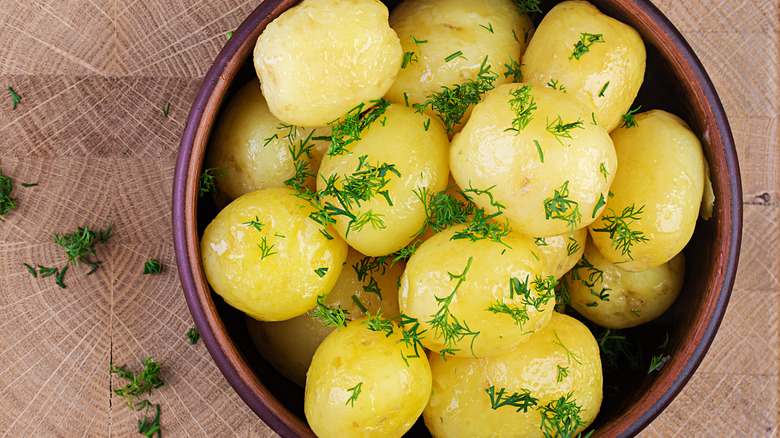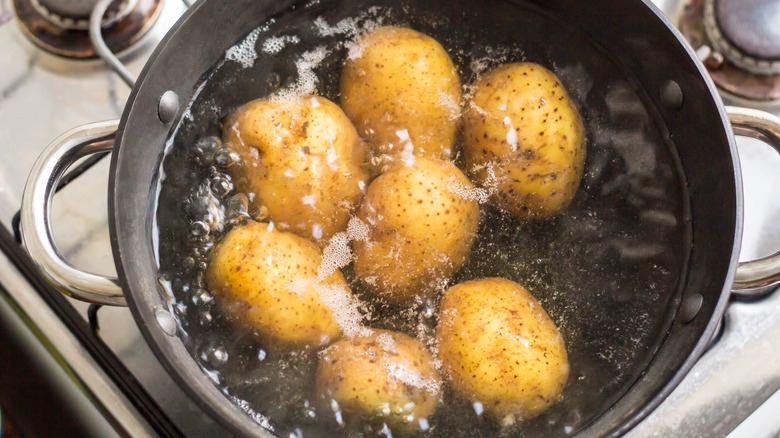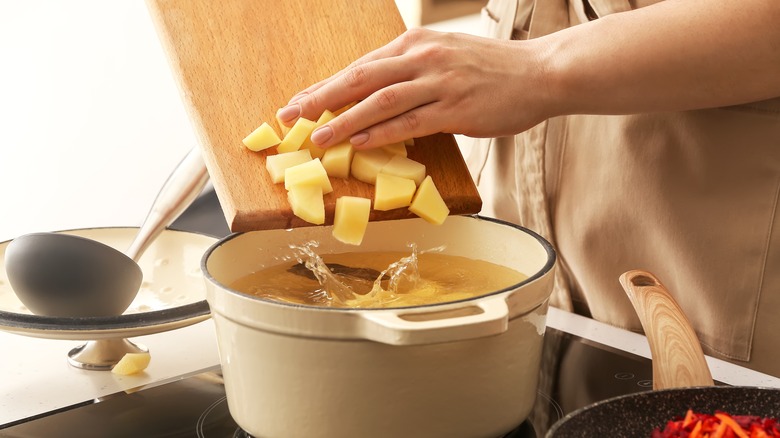When Is The Ideal Time To Salt Boiled Potatoes?
Boiling potatoes properly is one of the most foundational skills a person can have in the kitchen. It's a prerequisite for making all sorts of staple dishes, from mashed potatoes to potato salad. When you boil potatoes, you're softening them into a starchy, edible texture, of course — but it's also your first chance to season whatever dish it is that you're making. You probably know that you should add salt, but you might not know exactly when.
You could be forgiven for your uncertainty since salt interacts differently with different foods. You shouldn't salt mushrooms too early in the cooking process, for example, or you risk them taking on a tough, unappetizing texture. But with potatoes, there's no such concern. In fact, your best bet is to salt the water before you even toss the potatoes in.
Much like pasta, potatoes are starchy and pretty bland on their own, but absorb seasonings very effectively. In both cases, salting your water before you throw in the main ingredient is an important step for imparting flavor and building a dish that's delicious throughout every bite.
Salt potatoes early and generously
Adding salt from the very beginning is important because it's really your only chance to penetrate the potatoes with flavor. Any seasoning you add later on will, for the most part, just stick to the outside of the potatoes. This isn't a big deal if you're planning on making very finely mashed potatoes, since you're basically going to mix the potatoes and all other ingredients evenly. But in any other preparation, you're going to have some chunks of potato, and ideally, those chunks will be tasty, not just gobs of wet, grainy blah.
As for how much salt to add, you'll hear different advice based on who you ask, but the short answer is: a lot. If you're worried about oversalting, keep in mind that most of the water in your pot is going to be discarded anyway — and thus, so will a good portion of the salt. If you're unsure where to start, a good rule of thumb is to use a teaspoon of salt for every pound of potatoes you're boiling. Once they're drained and cooled, taste some of the boiled potato to see if it's too salty, or not salty enough, for your taste. Then, next time you boil potatoes, you can adjust the quantity of salt accordingly.
Peel, chop, or leave them whole
As for how to prep the potatoes before tossing them in the pot, that's largely up to you. Peeling them before boiling is fine, but not necessary. If you and the family prefer skinless potatoes, you can peel potatoes once they've boiled (and cooled down to a touchable temperature, thank you). They'll be tender enough that you can skip the veggie peeler and just use your fingers to take off the skin.
You can boil the potatoes whole or cut them into chunks first; just remember that smaller pieces cook faster, so small or chopped potatoes won't need to be over the heat for as long as whole, large ones. Use a fork to test if they're done: Once they're fully cooked, you should be able to easily pierce them all the way through. Also, don't wait until the water is boiling to add the potatoes, as this could cause them to cook unevenly, leaving the center hard and inedible while the outside is soft and tender. Place them in the pot, fully submerged in salted water, before you turn the heat on.
Salt is the most important seasoning when making potatoes (and, well, basically everything), but it doesn't have to be the only one. Add spices or herbs to the water before cooking to see what other flavors you can impart. Feel free to get creative and try boiling your potatoes in salted milk or stock for added flavor.


